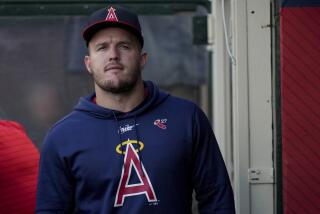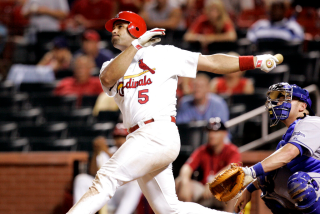Twins’ Puckett Is Part Mays, Part Mattingly
- Share via
MINNEAPOLIS — His dream house is being built in a suburb 10 miles northwest of the city, and for a kid who grew up in one of South Chicago’s toughest housing projects, it’s quite the digs.
Kirby Puckett’s new home will cost around $260,000 and will consist of five levels, with the basement serving as a weight room, the second level a combination hot tub-sauna area and the other three floors living quarters.
He had ordered another dream, a Jaguar, but when his fiance convinced him to spend a Lake Wobegon winter in Minnesota, he canceled the car order and bought a Ford Bronco instead.
He recently turned 25 and will earn close to $300,000 in 1986, and, in only his second full season with the Minnesota Twins, has been compared to everyone from Willie Mays to Don Mattingly.
Kirby Puckett?
“Those comparisons are a little much,” he said. “I’m just the best player I can be.”
Here’s how he’s special. First, there’s the package. He stands barely 5 feet 8, weighs 185 pounds and has a husky chest, thighs that resemble barrels and biceps like pistons.
The body not withstanding, Puckett has been baseball’s best hitter through the first six weeks of the 1986 season, leading the American League in home runs (11), runs (28), hits (43), batting average (.374) and extra-base hits (19).
Just as amazing is that his 11 homers came in the Twins’ first 27 games -- after he hit exactly four in his first 1,248 major league at-bats and never hit more than nine in any season in the minor leagues.
In the past few weeks, reporters have come from across the country to talk to him, and the way he comes across is the way people who know him say he is: a little quiet and a little cocky, but not overwhelmed by his success.
“No, I’m not surprised,” he said. “It was just a matter of doing some things with my stance. I’ve always told people that I can hit home runs, but they never believed me. It’s another facet of my game. I’m letting the pitchers know now that if they hang a pitch to me, they’re going to have to deal with it.”
Before 1986, baseball people considered him a good, but not great, player. Scouts always have said his throwing arm was among the best in the game, comparable to those of Boston’s Dwight Evans or Toronto’s Jesse Barfield. (In his first two years, Puckett led all of baseball in outfield assists -- 35.)
He did hit .296 his rookie season and .288 last year, but the perception was that he was someone who could bounce enough hits off artificial turf to stay in the game. (He hit .324 at the Metrodome last season, .251 on the road).
Now, after watching him this season, they’re saying he might be the game’s next superstar, a player with the speed to steal 30 bases, the power to hit 30 home runs and the swing to hit .300.
What happened?
“It’s the same thing the Yankees did with Mattingly, only Kirby hits the other way,” said Twins Manager Ray Miller, who has compared Puckett’s defensive game to that of Mays. “Mattingly never hit more than 10 homers in the minors, but they talked to him about pulling the ball in certain situations. Tony (Oliva, Twins hitting coach) did the same thing with Kirby.
“When you’re in certain counts, for instance 2-0 and 3-1, you’ve got to figure you’re going to get a fastball. That’s the time to try to pull it.”
During a spring training batting session, Oliva mentioned that teams were playing Puckett so radically toward right field -- 117 of his 199 hits in 1985 had been to the right side -- that on certain counts he should concentrate on staying back and pulling the pitch to left field.
“And all of a sudden, the ball started to jump out of the park,” Miller said. “I’m not talking little dinks over the fence. I’m talking monumental home runs. I think it really opened his eyes, and what it’s also going to do is get the defenses back to playing him more straight up, which is going to give back some of right field to him. But he hasn’t just been hitting homers.”
He has been hitting everything. His 16-game hitting streak, which ended Sunday, is the longest this season.
Along the way, he has become a major media star as well.
“Last weekend, there were so many people in Detroit who wanted to talk to him that it was a playoff-type atmosphere,” Miller said.
What they have found is just short of amazing. The youngest of nine children, Puckett was raised in the Robert Taylor Homes, a 16-block public housing project across the Dan Ryan Expressway from Comiskey Park in Chicago.
He is reluctant to discuss his childhood, but said, “The neighborhood was very tough. All my family, all nine kids, got out of the projects alive. When you can say that, you’re lucky.”
His first baseball games were a city game played with a pitcher, batter and brick wall. He said he was “14 or 15” before he played on a grass field.
His first organized team came at about that time, and he remembered, “Those were the glory days. Just running around, being a kid, I didn’t have no worries, no bills. I just wanted to play baseball. There were a lot of guys with me. They all kind of strayed off.”
That was a key point in his life because he took to the game so naturally, but another had come two years earlier when he was “a 5-4 runt” and started lifting weights, a routine he never has stopped and another reason he believes the home runs have come so naturally.
He went on to star at Chicago’s Calumet High School and accepted a scholarship to Bradley University. But when his father died during his freshman year, he went home for three weeks and eventually dropped out.
He then enrolled at Triton Junior College in River Grove, Ill., in 1981. When he went 11 for 16 at the national junior college tournament, the major league scouts took notice.
The next January, the Twins made him the third player selected in the 1982 draft, and his rise through the minors was quick. He hit .382 at Elizabethton in 1982, .314 at Visalia in 1983 and .263 at Toledo in 1984 before being brought to the major leagues in May.
Almost no one expects him to continue at his current pace, but no one is saying he’s a six-week flash in the pan either.
More to Read
Go beyond the scoreboard
Get the latest on L.A.'s teams in the daily Sports Report newsletter.
You may occasionally receive promotional content from the Los Angeles Times.






